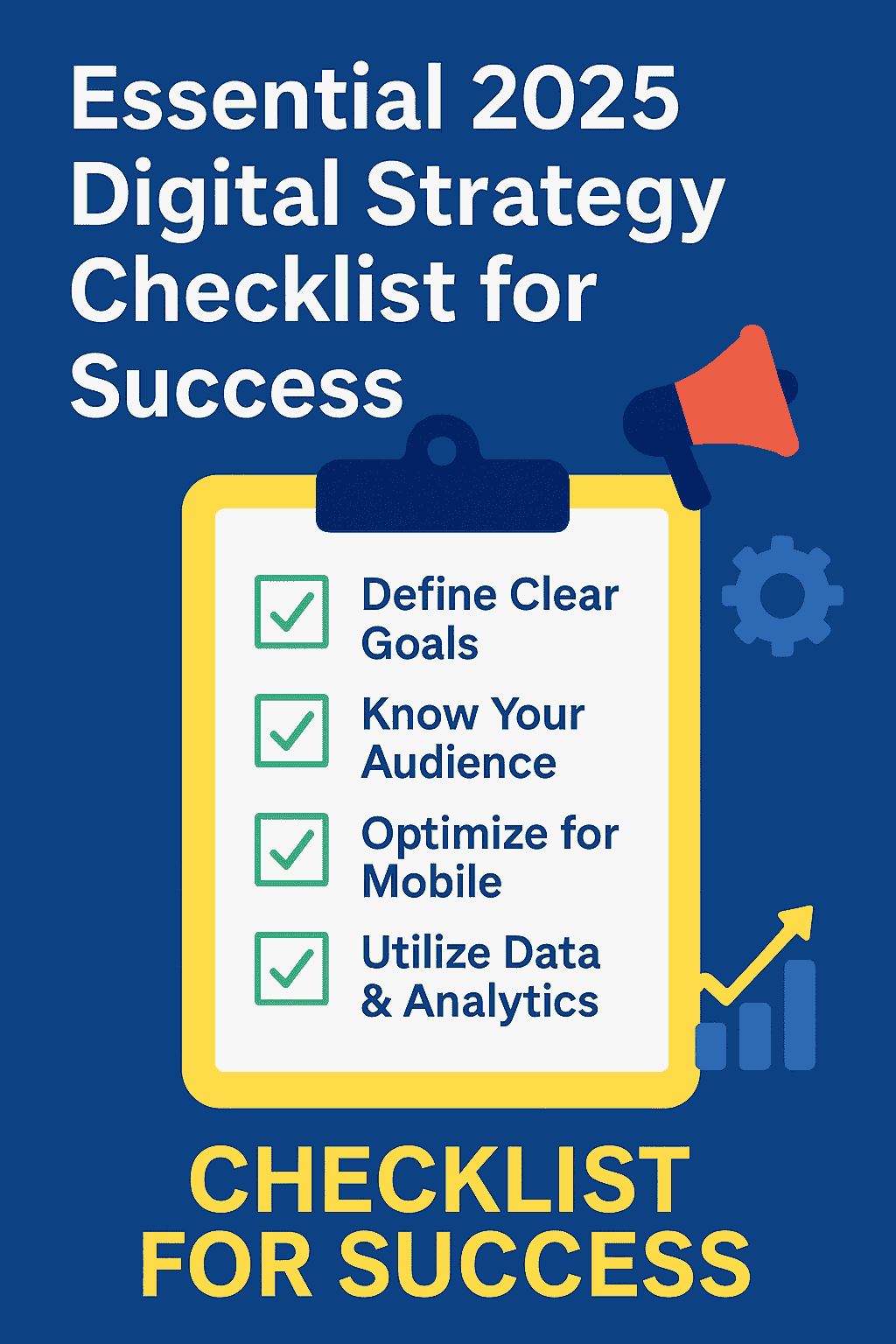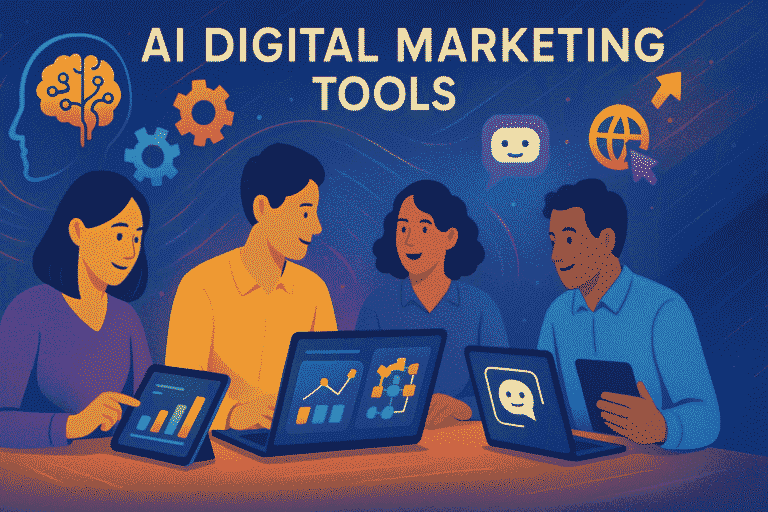As we approach 2025, developing a robust digital strategy has become the cornerstone of successful business planning. The digital landscape continues to evolve rapidly, making a well-structured digital marketing plan essential for companies of all sizes.
Recent studies show that businesses with documented digital strategies achieve 34% higher success rates in their marketing efforts. This comprehensive checklist will guide you through creating an effective digital strategy that aligns with your business planning objectives and maximizes your digital marketing plan’s potential.
Key areas we’ll cover include:
- Foundational elements of modern digital strategy
- Emerging technologies to incorporate
- Implementation frameworks
- Performance measurement techniques
Whether you’re refining an existing digital marketing plan or building one from scratch, this guide provides actionable insights to elevate your business planning for 2025.
1. Digital Foundation: Website and Technical SEO
Website Optimization for Your Digital Strategy
Your website remains the hub of your digital marketing plan. In 2025, users expect:
- Sub-second load times
- Flawless mobile experiences
- Intuitive navigation systems
- Full accessibility compliance
Key Components of Website Optimization:
- Core Web Vitals Improvement:
- Optimize Largest Contentful Paint (LCP) to under 1.5 seconds
- Minimize Cumulative Layout Shift (CLS) for visual stability
- Enhance First Input Delay (FID) for better interactivity
- Mobile-First Approach:
- Implement responsive design principles
- Test across all device types
- Optimize touch targets and mobile navigation menus
- Technical SEO Audit:
- Resolve crawl errors using Google Search Console
- Implement proper canonical tags
- Optimize robots.txt file
- Create and submit XML sitemaps
Pro Tip: Regular website audits should be a fundamental part of your business planning process. Use tools like Screaming Frog to identify technical issues that could hinder your digital strategy performance.
2. Content Strategy That Converts
Developing a Content Framework for Your Digital Marketing Plan
Content remains a critical component of any effective digital strategy. In 2025, successful content strategies require:
- Pillar Content Architecture:
- Create comprehensive pillar pages (3,000+ words)
- Develop supporting cluster content pieces
- Implement strategic internal linking structure
- Multimedia Content Mix:
- Short-form video content (TikTok, Instagram Reels)
- Long-form video content (YouTube, webinars)
- Interactive content (quizzes, calculators)
- Audio content and podcasts
- Content Distribution Strategy:
- Organic social media promotion
- Email marketing sequences
- Paid amplification strategies
- Influencer collaborations
Content Calendar Example for Business Planning:
| Week | Content Type | Distribution Channels | KPIs |
|---|---|---|---|
| 1 | Blog Post | Website, LinkedIn, Email | Page Views, Time on Page |
| 2 | Video | YouTube, Instagram | Views, Engagement Rate |
| 3 | Infographic | Pinterest, Twitter | Shares, Backlinks |
| 4 | Case Study | Website, LinkedIn | Leads Generated |
Pro Tip: Align your content calendar with your overall business planning timeline to ensure consistent messaging across all digital marketing plan components.
3. AI and Automation in Your Digital Strategy
Implementing AI for Business Planning
Artificial intelligence has become a game-changer in modern digital marketing plans. Key implementations include:
- AI-Powered Personalization:
- Dynamic website content adaptation
- Personalized product recommendations
- Customized email marketing campaigns
- Automated Customer Service:
- AI chatbots for 24/7 customer support
- Automated response systems
- Sentiment analysis tools
- Predictive Analytics:
- Customer behavior forecasting
- Sales trend predictions
- Inventory management optimization
AI Implementation Roadmap:
- Start with one AI application in your digital strategy
- Measure results and calculate ROI
- Scale successful implementations
- Continuously optimize based on performance data
Case Study: Businesses incorporating AI into their digital marketing plans see up to 30% higher efficiency and 25% increased revenue. For more insights, explore resources from the Marketing AI Institute.
4. Social Media Mastery for Business Planning
Platform-Specific Strategies in Your Digital Marketing Plan
Each social platform requires a tailored approach in your digital strategy:
Facebook/Instagram:
- Focus on community building
- Leverage Stories and Reels
- Utilize shopping features
LinkedIn:
- Share thought leadership content
- Engage in B2B networking
- Post professional development content
TikTok:
- Create short, engaging videos
- Participate in trends
- Collaborate with influencers
Twitter/X:
- Engage in real-time conversations
- Share industry news
- Provide customer service
Emerging Platforms:
- Monitor new platform developments
- Experiment with early adoption
- Track engagement metrics
Pro Tip: Use social media management tools like Hootsuite or Buffer to schedule posts and analyze performance across platforms as part of your business planning process.
5. Data-Driven Decision Making
Analytics Tools for Your Digital Strategy
- Google Analytics 4:
- Track user behavior
- Analyze conversion paths
- Measure cross-platform performance
- Heatmapping Tools:
- Hotjar for user behavior visualization
- Crazy Egg for click tracking
- Session recording analysis
- CRM Integration:
- Salesforce for customer data management
- HubSpot for marketing automation
- Zoho for small business solutions
Key Metrics to Track in Your Digital Marketing Plan:
- Customer Acquisition Cost (CAC)
- Customer Lifetime Value (CLV)
- Conversion Rates by Channel
- Return on Ad Spend (ROAS)
- Engagement Metrics
Data Visualization: Use tools like Tableau or Google Data Studio to create dashboards that make complex data easily understandable for stakeholders in your business planning meetings.
Conclusion (100 words)
Building a successful digital strategy for 2025 requires a comprehensive approach that combines technical excellence with creative marketing. By focusing on these key areas—website optimization, content strategy, AI integration, social media mastery, and data-driven decision making—you’ll create a robust foundation for digital success.
Remember that your digital strategy should be an evolving component of your business planning, not a static document. Continuously monitor performance metrics, stay updated on emerging trends, and be ready to adapt your digital marketing plan as needed. The most successful businesses in 2025 will be those that remain agile and customer-focused in their digital efforts.
Final Tip: Schedule quarterly digital strategy reviews to assess what’s working, identify areas for improvement, and discover new opportunities to enhance your business planning and digital marketing plan.
Internal Link: For more advanced strategies, check out our guide on Advanced Digital Marketing Techniques for 2025.
External Resource: Stay updated with the latest digital marketing trends at Marketing Land.





